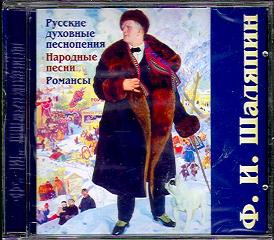Chaliapin – Ruskiye Duhovnye Pesnopenya Narodnye Pesni Romansy (2005)
Chaliapin – Ruskiye Duhovnye Pesnopenya Narodnye Pesni Romansy (2005)

01. Сугубая ектения. A. Гречанинов
02. Покаяния отверзи ми двери.А. Ведель
03. Ныне Отпущаеши. Строкин
04. Верую. А. Архангельский
05. Жило двенадцать разбойников. Русская народная песня
06. Вниз по матушке по Волге. Русская народная песня play
07. Из-за острова. Русская народная песня
08. Ты взойди, взойди. Русская народная песня
09. Эй, ухнем. Русская народная песня
10. Ноченька. Русская народная песня
11. Дубинушка. Русская народная песня
12. Эх ты, Ванька. Русская народная песня
13. Прощай, радость. Русская народная песня
14. Не велят Маше.Русская народная песня
15. Пророк.А. Римский-Корсаков
16. Блоха. М. П. Мусоргский
17. Ночной смотр. Русская народная песня
18. Старый капрал. А. Даргомыжский
19. Странник. Маныкин-Невструев play
20. Сомнение. М. Глинка
Feodor Chaliapin. Born February 13, 1873 in Kazan, Russia
Died April 12, 1938 in Paris, France
Feodor Chaliapin is perhaps the most legendary operatic bass in history. Possessed of a large and beautiful voice, he devoted himself to all aspects of his art -- most significantly his dramatic portrayals -- at a time when such things were not at all typical of singers. Chaliapin was born the son of Russian peasants and was apprenticed to a cobbler at the age of ten. However, a brief engagement with a touring opera and a fortuitous meeting with his first voice teacher, Dimitri Usatov (both during his teen years), alerted the young singer to the true extent of his musical potential. Usatov was, in fact, so impressed with the young man that agreed to teach him free of charge.
In 1894, Chaliapin sang in St. Petersburg and soon was accepted at the Imperial Opera. In 1896, he sang with a private opera company in Moscow, making his debut as Ivan Susanin in Glinka's A Life for the Tsar, for which he received excellent reviews. At the same time, he gave many successful solo concerts. His first appearance outside Russia was in Boito's Mefistofele at Teatro alla Scala in 1901. He sang nearly every season at Monte Carlo from 1905 to 1937. His first role there was King Philip in Don Carlo, and there he created the role of Don Quixote in Massenet's setting of that tale. In 1933 he starred in a film about the same idealistic knight (this project was ultimately left incomplete, but it resulted in the fine Don Quichotte songs of both Maurice Ravel and Jacques Ibert).
In 1907, the bass made his Metropolitan Opera debut in Boito's Mefistofele, and later that season sang both Gounod's Faust (Mefistophele) and Mozart's Don Giovanni (Leporello). His return to the United States was delayed until 1921 when he sang the title role in Boris Godunov. He sang with the Metropolitan Opera until 1929. In 1908, Chaliapin began his close association with Diaghilev in Paris, where many famous productions of Russian operas were staged. He sang several Russian roles at Covent Garden, London in 1913. In 1914, he returned to Russia and stayed until after World War I and the Great Revolution. In 1922, he immigrated to France, which remained his home for the remainder of his life. Chaliapin appeared in nearly all of the great opera houses of Europe, as well as those of England and the United States; in 1935-36 he made a world tour, including performances in China and Japan.
Chaliapin was a large man with great dramatic flair, and he could portray any type of character. He was a master of make-up, and he used this skill to help create his characters. His voice was wide ranging, allowing him to sing baritone roles like Eugene Onegin as well as bass roles like Oroveso. In his recitals, he never revealed what he would sing; the printed program would simply say "Selections to be announced." When he immigrated to Paris, he fell out of favor with the Russian government, but his native country's official posture toward him warmed when it became apparent that he was bringing Russian opera to people all over the world. Besides the Russian operas already mentioned, Chaliapin also sang Khovanchina, Prince Igor, Dargomyzhsky's Rusalka, Sadko, Mozart and Salieri (which he premiered), Rubinstein's The Demon, Serov's Judith and Gretchaninov's Dobrinya Nikititsch. His art is preserved on his many recordings made between 1901 and 1935 which document his wide ranging repertoire. Without his performances of Boris Godunov, the opera would probably not have had the enduring popularity that it has subsequently enjoyed. ~ Richard LeSueur, All Music Guide
download: uploaded anonfiles yandex 4shared solidfiles mediafire mega filecloudio
Zmieniony (Czwartek, 14 Listopad 2013 10:37)








